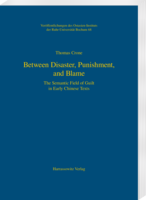|
weitere Titel zum Thema:
Download:
Bitte beachten Sie: Mit digitalen Produkten in Ihrem Warenkorb
wird die Bezahlung nur per PayPal möglich. Der Download dieser Produkte wird bereitgestellt, wenn die Bezahlung bestätigt ist. The concept of having done something wrong is an integral part of normative thinking and thus a human universal. With regard to the early Chinese world of ideas and the resulting Confucian value system, consensus has it that the normative forces of “shame” have played a particularly strong role in the conceptualization and assessments of wrongdoings.
This study aims to broaden our understanding of these processes by examining a group of synonyms associated with different states of “guilt” (i.e. the fact of having committed something wrong), in the course of their historical development during the pre-Qin period (appr. 1250–221 BCE). By outlining the synchronic conceptual differences and diachronic changes of these synonyms and framing them in their sociopolitical context, this attempts to relate the early history of a concept that has so far received little scholarly attention. The results of this study offer many surprises and show overall that the concept of guilt in early Chinese texts is much more nuanced than previously assumed. They provide impressive evidence of the emergence and growth of several expert discourses on the subject of guilt, thus challenging the notion of early China as a representative of a “shame culture.” |
|||||||||||||||||||||||||||||||||||||||






